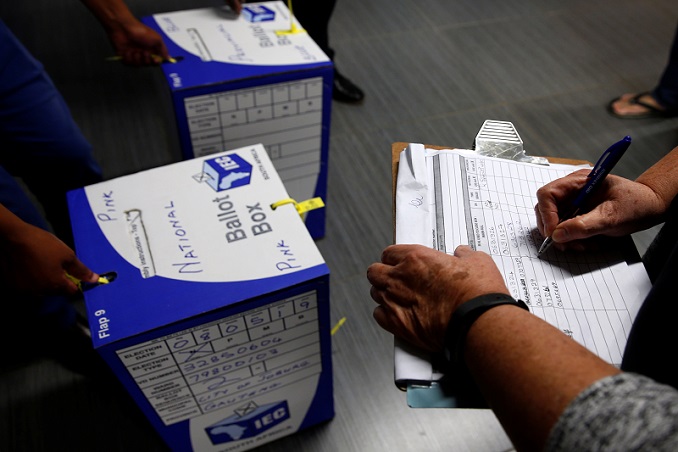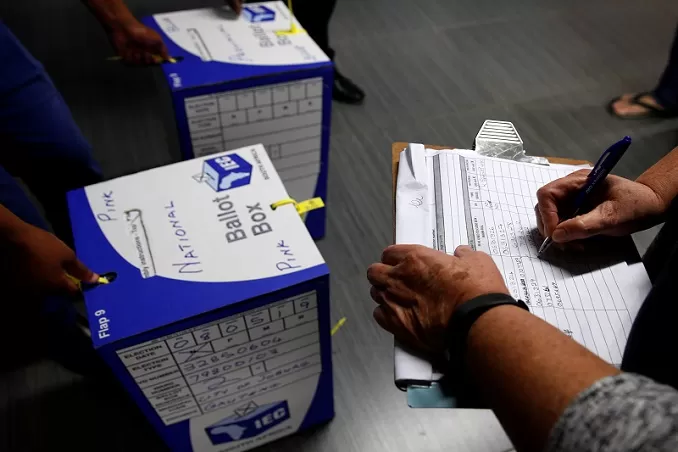

election officials seal ballot boxes at the end of voting in south africa's parliamentary and provincial elections at a polling station in johannesburg
![]()
![]()
According to South Africa’s Independent Electoral Commission (IEC), a record number of 325 parties have registered to contest the elections for 10,478 seats in the 257 municipalities. The polls will, however, elect only two field candidates in all the areas to be contested.
The Monday elections will be a stiff test for ruling ANC (African National Congress) since the end of apartheid. The party has won all general elections since 1994 but with the old party smeared in corruption and petty infighting, the elections will prove to be a real litmus test as it attempts to renew its image with new offerings. “We know that some of our councilors have grown distant. Others appear arrogant and unconcerned about the challenges our people face. This comes to an end at this election,” South African President and ANC leader Cyril Ramaphosa told party candidates said while signing the party pledge.
The country’s constitutional court had ordered in September the holding of municipal elections, thereby rejecting a request by the Independent Electoral Commission (IEC) that was seeking postponement of elections citing pandemic. “The ballot will go ahead as per the court judgment notwithstanding the challenges we face in delivering this election,” Glen Mashinini, chairperson of the IEC said.
The pushed ahead date of elections has left political parties in South Africa panicking and scrambling due to the extremely shrunk time period for campaigning by eight weeks.
Department of Cooperative Governance and Traditional Affairs (Cogta) showed in its report that many South Africa’s municipalities are facing financial roadblocks and are on the brink of collapse. “You just need to travel to any municipality currently run by the ANC and you’ll see it is a disaster,” said a leader of the official opposition Democratic Alliance (DA) John Steenhuisen. “You’ll see people living in grinding poverty without any services, sewage running down the street and electricity that is irregular at best.”
Campaign tools for the municipal elections have ranged from local issues to xenophobia, Covid-19 pandemic and vaccine hesitancy. Several parties have made promises to prevent COVID-19 vaccine mandates and/or deport undocumented immigrants. “Fake messaging and half-truths is starting to take hold in some corners of the campaign,” Ebrahim Fakir, political analyst at the Auwal Socio-economic Research Institute (ASRI) noted. “Where incorrect information is being used to whip up emotion and get people to vote based on fears involving national issues that can’t be changed in a local election.”
Religion too remains to be a political issue at forefront. “The South African community is actually a deeply religious one. However, we have not seen this religiosity or religious conservatism actually translating in party politicking that we are beginning to see now,” Professor Farid Esack, religious studies expert at the University of Johannesburg said.
The largely peaceful campaigns by parties have remained door-to-door instead of mass gatherings due to Covid-19 restrictions.
Manchester United manager Ruben Amorim has confirmed that defender Diogo Dalot might miss the rest of the season due to…
Tanzanian President Samia Suluhu Hassan has praised Simba SC after the team made history by reaching the final of the…
The Vatican has initiated its traditional selection protocol to choose the next Pope following the passing of Pope Francis. The…
"Baby Shark Dance" is still making waves in 2025! The kids' song by South Korea's Pinkfong is now the most-watched…
Kenyan sprint star Ferdinand Omanyala finished second at the opening race of the Diamond League in Xiamen, China, on Saturday.…
The incessant rains have caused flooding in Durban and its neighboring areas. It has disrupted several core areas, with a…
This website uses cookies.